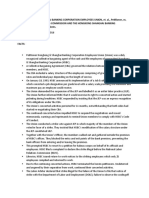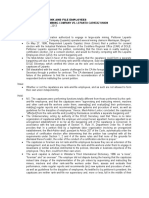HSBC Employees Union Vs NLRC
HSBC Employees Union Vs NLRC
Uploaded by
RobertCopyright:
Available Formats
HSBC Employees Union Vs NLRC
HSBC Employees Union Vs NLRC
Uploaded by
RobertOriginal Description:
Original Title
Copyright
Available Formats
Share this document
Did you find this document useful?
Is this content inappropriate?
Copyright:
Available Formats
HSBC Employees Union Vs NLRC
HSBC Employees Union Vs NLRC
Uploaded by
RobertCopyright:
Available Formats
HSBC EMPLOYEES UNION V.
NLRC
G.R. No. 156635
January 11, 2016
DOCTRINE: A strike staged without compliance with the requirements of Article 263 of
the Labor Code is illegal, and may cause the termination of the employment of the participating
union officers and members. However, the liability for the illegal strike is individual, not
collective. To warrant the termination of an officer of the labor organization on that basis, the
employer must show that the officer knowingly participated in the illegal strike. An ordinary
striking employee cannot be terminated based solely on his participation in the illegal strike, for
the employer must further show that the employee committed illegal acts during the strike.
FACTS: Petitioner HSBC-EU was the duly recognized collective bargaining agent of the rank-
and-file employees of Respondent HSBC. The latter has announced its implementation of Job
Evaluation Program (JEP) consisted of a job designation per grade level with the accompanying
salary scale providing for the minimum and maximum pay the employee could receive per salary
level. This was opposed by the union.
The Union demanded the suspension of the JEP, which it labeled as an unfair labor practice
(ULP). The Union members then walked out and gathered outside the premises of HSBC
blocked the entry and exit points of the bank premises, preventing the bank officers from leaving
the premises whom the HSBC airlifted to enable them to leave the bank premises.
In the meantime, HSBC issued return-to-work notices to the striking employees but only few
employees complied and returned to work. Due to the continuing concerted actions, HSBC
terminated the individual petitioners. The latter, undeterred, and angered by their separation from
work, continued their concerted activities.
ISSUE: Whether the strike commenced was lawfully conducted?
HELD: No. The strike rendered was illegal.
The petitioners neither filed the notice of strike with the DOLE, nor observed the cooling-off
period, nor submitted the result of the strike vote. Moreover, although the strike vote was
conducted, the same was done by open, not secret, balloting, in blatant violation of Article 263
and Section 7, Rule XIII of the Omnibus Rules Implementing the Labor Code. It is not amiss to
observe that the evident intention of the requirements for the strike-notice and the strike-vote
report is to reasonably regulate the right to strike for the attainment of the legitimate policy
objectives embodied in the law. As such, the petitioners committed a prohibited activity under
Article 264(a) of the Labor Code, and rendered their strike illegal.
You might also like
- Republic Act 3019Document44 pagesRepublic Act 3019Joseph Santos Gacayan78% (9)
- Complaint For Legal Malpractice, Negligence and Breach of ContractDocument9 pagesComplaint For Legal Malpractice, Negligence and Breach of ContractDaily Times100% (1)
- Labor Rev Cases 3rd Bacth ConsolidatedDocument30 pagesLabor Rev Cases 3rd Bacth ConsolidatedRhows BuergoNo ratings yet
- Consti ReviewerDocument227 pagesConsti ReviewerJecka Louise100% (4)
- HSBC Vs NLRC, G.R. No. 156635Document2 pagesHSBC Vs NLRC, G.R. No. 156635Jica Gula100% (1)
- Case Digest - GR 154591Document3 pagesCase Digest - GR 154591RewsEn0% (1)
- Revidad v. NLRC G.R. No. 111105, June 27, 1995Document2 pagesRevidad v. NLRC G.R. No. 111105, June 27, 1995wewNo ratings yet
- FEU v. Trajano (1987)Document3 pagesFEU v. Trajano (1987)GR100% (1)
- M5.2 Lepanto Consolidated Mining Company v. The Lepanto Capatas UnionDocument2 pagesM5.2 Lepanto Consolidated Mining Company v. The Lepanto Capatas UnionHartel BuyuccanNo ratings yet
- United CMC Textile Workers Union v. BLRDocument6 pagesUnited CMC Textile Workers Union v. BLRSamuel Valladores100% (1)
- Eagle Ridge Golf & Country Club v. CADocument2 pagesEagle Ridge Golf & Country Club v. CANicole KalingkingNo ratings yet
- Villavilla Vs CADocument6 pagesVillavilla Vs CABobby ParksNo ratings yet
- Hijo Resources Corp Vs MijaresDocument1 pageHijo Resources Corp Vs MijaresRobertNo ratings yet
- Topic Doctrine: Kapatiran Sa Meat and Canning Division (Tupas Local ChapterDocument2 pagesTopic Doctrine: Kapatiran Sa Meat and Canning Division (Tupas Local ChapterSherry Jane GaspayNo ratings yet
- Transportation Law 1994 Bar Questions by LubayDocument10 pagesTransportation Law 1994 Bar Questions by LubayAngelo CastilloNo ratings yet
- Lepanto Consolidated Mining Company vs. Lepanto Capataz UnionDocument2 pagesLepanto Consolidated Mining Company vs. Lepanto Capataz UnionSecret BookNo ratings yet
- PHILIPPINE AIRLINES, INC. v. ALEXANDER P. BICHARA, G.R. No. 213729, 02 September 2015 (Case Digest)Document4 pagesPHILIPPINE AIRLINES, INC. v. ALEXANDER P. BICHARA, G.R. No. 213729, 02 September 2015 (Case Digest)Anne Lorraine Pongos Co0% (1)
- Lab Rel 2010 - Case DigestsDocument2 pagesLab Rel 2010 - Case DigestsAlfie OmegaNo ratings yet
- Puig vs. PenafloridaDocument4 pagesPuig vs. PenafloridaMonikkaNo ratings yet
- Club Filipino v. BautistaDocument1 pageClub Filipino v. BautistaAfricaEdnaNo ratings yet
- Golden Farms Inc Vs Hon. Ferrer-Calleja, BLRDocument3 pagesGolden Farms Inc Vs Hon. Ferrer-Calleja, BLRbrendamanganaanNo ratings yet
- G.R. No. 122226 March 25, 1998 Mendoza, J:) Will Still Be ExcludedDocument2 pagesG.R. No. 122226 March 25, 1998 Mendoza, J:) Will Still Be ExcludedgerlynNo ratings yet
- Club Filipino, Inc., Et. Al. v. Benjamin Bautista, Et. Al. G.R. No. 168406 FACTS: CLUFEA, A Union Representing The Employees of Club Filipino, IncDocument4 pagesClub Filipino, Inc., Et. Al. v. Benjamin Bautista, Et. Al. G.R. No. 168406 FACTS: CLUFEA, A Union Representing The Employees of Club Filipino, IncPlandito ElizabethNo ratings yet
- Coca-Cola Bottlers v. Ilocos Professional (G.R. No. 193798. September 9, 2015.)Document1 pageCoca-Cola Bottlers v. Ilocos Professional (G.R. No. 193798. September 9, 2015.)Emmanuel Alejandro YrreverreIiiNo ratings yet
- 63 Malayang Samahan NG Manggagawa Sa Greenfield V RamosDocument3 pages63 Malayang Samahan NG Manggagawa Sa Greenfield V RamosAllyson Michael Jude MaraonNo ratings yet
- 74 MSMG-UWP V RamosDocument3 pages74 MSMG-UWP V RamosRuther FloresNo ratings yet
- Viviero vs. CADocument4 pagesViviero vs. CAKatrina Para PresiNo ratings yet
- NUBE Vs Sec of Labor and Standard Bank DigestDocument2 pagesNUBE Vs Sec of Labor and Standard Bank DigestRodz TennysonNo ratings yet
- 089 & 117-Victoriano v. Elizalde Rope Workers' Union G.R. No. L-25246 September 12, 1974Document14 pages089 & 117-Victoriano v. Elizalde Rope Workers' Union G.R. No. L-25246 September 12, 1974Jopan SJNo ratings yet
- CIR Vs Euro-Philippines Airline ServicesDocument10 pagesCIR Vs Euro-Philippines Airline ServicesBeltran KathNo ratings yet
- United Pepsi Cola Supervisory Union Vs LaguesmaDocument3 pagesUnited Pepsi Cola Supervisory Union Vs LaguesmaLei MorteraNo ratings yet
- Summary of Significant SC Decisions (September-December 2013)Document3 pagesSummary of Significant SC Decisions (September-December 2013)anorith88No ratings yet
- 51 Toyota Vs Toyota Labor Union, GR 121084, Feb 19, 1997Document5 pages51 Toyota Vs Toyota Labor Union, GR 121084, Feb 19, 1997Perry YapNo ratings yet
- Labor Relations DigestsDocument10 pagesLabor Relations DigestsRaymer OclaritNo ratings yet
- Rule 129, Section 4 - Pcic vs. Central Colleges - Weill, Ann LaurenDocument8 pagesRule 129, Section 4 - Pcic vs. Central Colleges - Weill, Ann LaurenannlaurenweillNo ratings yet
- Goya Inc VS Goya Employees UnionDocument7 pagesGoya Inc VS Goya Employees UnionChing GonzalesNo ratings yet
- Taxation Law Bar Exam Questions 2011 AnswersDocument14 pagesTaxation Law Bar Exam Questions 2011 AnswersYochabel Eureca BorjeNo ratings yet
- Bukluran NG Manggagawa Sa Clothman Knitting v. CADocument2 pagesBukluran NG Manggagawa Sa Clothman Knitting v. CAKara SolidumNo ratings yet
- LVN Pictures V LVN Pictures, IncDocument2 pagesLVN Pictures V LVN Pictures, IncCZARINA ANN CASTRONo ratings yet
- Genuino Vs NLRCDocument2 pagesGenuino Vs NLRCJester KutchNo ratings yet
- Labstan AssignmentDocument47 pagesLabstan Assignmentjade123_129No ratings yet
- GR No. 200499 - San Fernando Coca-Cola VS Coca-Cola BottlersDocument3 pagesGR No. 200499 - San Fernando Coca-Cola VS Coca-Cola BottlersMicah Clark-Malinao100% (1)
- Bagong Pagkakaisa NG Mga Manggagawa NG Triumph V, SOLEDocument1 pageBagong Pagkakaisa NG Mga Manggagawa NG Triumph V, SOLEKaren GinaNo ratings yet
- 6th Batch - BCI vs. BCI EmployeesDocument3 pages6th Batch - BCI vs. BCI EmployeesAngelReaNo ratings yet
- MANILA GAS CORPORATION Vs ONGSIPDocument2 pagesMANILA GAS CORPORATION Vs ONGSIPJigs JiggalowNo ratings yet
- Training OdsDocument173 pagesTraining OdsDechy Lyn PalmaNo ratings yet
- Transportation LawDocument40 pagesTransportation LawCzarina BantayNo ratings yet
- Labor Case 124-147 DigestsDocument30 pagesLabor Case 124-147 DigestsAnonymous QlsnjX1No ratings yet
- TOPIC: Liability For The Death of A PassengerDocument3 pagesTOPIC: Liability For The Death of A PassengerNur OmarNo ratings yet
- 283 Manila Hotel Employees Association V Manila HotelDocument3 pages283 Manila Hotel Employees Association V Manila HotelCJ Millena100% (1)
- Phil Diamond Hotel V Manila Diamond Hotel Employees UnionDocument4 pagesPhil Diamond Hotel V Manila Diamond Hotel Employees UnionCristelle Elaine ColleraNo ratings yet
- AER Vs PROGRESIBONG UNYON NG MGA MANGGAGAWA SA AERDocument2 pagesAER Vs PROGRESIBONG UNYON NG MGA MANGGAGAWA SA AERpnp bantayNo ratings yet
- Toyota Vs Union 1997 DigestDocument3 pagesToyota Vs Union 1997 DigestMekiNo ratings yet
- PICOP Resources Inc V TanecaDocument3 pagesPICOP Resources Inc V TanecaEmma GuancoNo ratings yet
- University of San Agustin Employees Union Vs CADocument1 pageUniversity of San Agustin Employees Union Vs CAJulius Geoffrey TangonanNo ratings yet
- Osmeña V. Orbos DoctrineDocument1 pageOsmeña V. Orbos DoctrineLynne SanchezNo ratings yet
- 34 - Medela vs. Caro (126 SCRA 293)Document2 pages34 - Medela vs. Caro (126 SCRA 293)Gretchen Dominguez-ZaldivarNo ratings yet
- CASE DIGEST Eagle Ridge V CADocument1 pageCASE DIGEST Eagle Ridge V CAhayleyNo ratings yet
- Marcopper Mining V NLRCDocument3 pagesMarcopper Mining V NLRCAbby PerezNo ratings yet
- State Street Bank Trust Co vs. Signature Financial GroupDocument2 pagesState Street Bank Trust Co vs. Signature Financial GroupIñigo Mathay RojasNo ratings yet
- Atty Rodriguez LIP-Digest-Compiled PDFDocument80 pagesAtty Rodriguez LIP-Digest-Compiled PDFPaula Jane EscasinasNo ratings yet
- HSBC Union vs. NLRCDocument2 pagesHSBC Union vs. NLRCLino Viadnes50% (2)
- Labor Relations CasesDocument50 pagesLabor Relations CasesMary Kaye ValerioNo ratings yet
- People Vs ZZZZZDocument15 pagesPeople Vs ZZZZZRobertNo ratings yet
- People Vs ReyesDocument2 pagesPeople Vs ReyesRobertNo ratings yet
- People Vs PanerioDocument2 pagesPeople Vs PanerioRobertNo ratings yet
- People Vs HHHDocument11 pagesPeople Vs HHHRobertNo ratings yet
- People Vs DilimanDocument3 pagesPeople Vs DilimanRobertNo ratings yet
- Adlawan Vs PeoplDocument2 pagesAdlawan Vs PeoplRobertNo ratings yet
- People Vs ContiDocument5 pagesPeople Vs ContiRobertNo ratings yet
- Cando Vs SolisDocument6 pagesCando Vs SolisRobertNo ratings yet
- Oca Vs ToledoDocument7 pagesOca Vs ToledoRobertNo ratings yet
- Perez Vs CTADocument1 pagePerez Vs CTARobertNo ratings yet
- Mactan Cebu International Airport Authority Vs MarcosDocument1 pageMactan Cebu International Airport Authority Vs MarcosRobertNo ratings yet
- Commissioner of Internal Revenue Vs BotelhoDocument1 pageCommissioner of Internal Revenue Vs BotelhoRobertNo ratings yet
- Death Penalty or Life ImprisonmentDocument1 pageDeath Penalty or Life ImprisonmentRobertNo ratings yet
- CIR Vs Lingayen GulfDocument1 pageCIR Vs Lingayen GulfRobertNo ratings yet
- The Philippine Guaranty Co Vs CIRDocument1 pageThe Philippine Guaranty Co Vs CIRRobertNo ratings yet
- Roxas Vs CTADocument1 pageRoxas Vs CTARobertNo ratings yet
- CIR Vs Lingayen GulfDocument1 pageCIR Vs Lingayen GulfRobertNo ratings yet
- On-Line Application For Single Window Operator (Swo) : Registration #: 3146857 Full Name: Rahul Chandra KholiyaDocument3 pagesOn-Line Application For Single Window Operator (Swo) : Registration #: 3146857 Full Name: Rahul Chandra KholiyaRahul KholiyaNo ratings yet
- National Steel Corporation vs. CADocument4 pagesNational Steel Corporation vs. CAJustin Luis JalandoniNo ratings yet
- Padelford, Fay & Co vs. The Mayor and Alderman of The City of SavannahDocument49 pagesPadelford, Fay & Co vs. The Mayor and Alderman of The City of SavannahMaverick6026100% (6)
- Law of ContractDocument14 pagesLaw of ContractMike OngNo ratings yet
- Magistrate John Fasone, Lawyer Yonatan Levoritz Fraud by The Court Upon FatherDocument12 pagesMagistrate John Fasone, Lawyer Yonatan Levoritz Fraud by The Court Upon FatherSLAVEFATHER100% (1)
- Diversion: Q: What Is Diversion?Document6 pagesDiversion: Q: What Is Diversion?Dbee DveeNo ratings yet
- National Press Club v. Comelec G.R. No. 102653 March 5, 1992Document35 pagesNational Press Club v. Comelec G.R. No. 102653 March 5, 1992Maritoni RoxasNo ratings yet
- CASE 2: G.R. NO. 129242 January 16, 2001 Manalo vs. CADocument3 pagesCASE 2: G.R. NO. 129242 January 16, 2001 Manalo vs. CAJay Kent RoilesNo ratings yet
- United States v. Deontrayvia Adams, 4th Cir. (2012)Document22 pagesUnited States v. Deontrayvia Adams, 4th Cir. (2012)Scribd Government DocsNo ratings yet
- SOUTH TEXAS CORRUPTION - An OverviewDocument16 pagesSOUTH TEXAS CORRUPTION - An OverviewJohn Foddrill SrNo ratings yet
- Undang-Undang Melaka (Malacca Laws) and It Is Still Embodied Into Our Current Parallel Legal SystemDocument2 pagesUndang-Undang Melaka (Malacca Laws) and It Is Still Embodied Into Our Current Parallel Legal SystemNuratiah ZakariaNo ratings yet
- Unit - 2 Significance and Characteristics of Fundamental RightsDocument13 pagesUnit - 2 Significance and Characteristics of Fundamental RightsjeganrajrajNo ratings yet
- LAW 102-Introduction To Pakistan Legal System-Marva KhanDocument6 pagesLAW 102-Introduction To Pakistan Legal System-Marva Khanfarah khanNo ratings yet
- Charged Offenses Against Brian ColeDocument3 pagesCharged Offenses Against Brian ColeChristopher ChristieNo ratings yet
- January Grand Jury IndictmentsDocument2 pagesJanuary Grand Jury IndictmentsvincedonoghueNo ratings yet
- Statcon PrinciplesDocument6 pagesStatcon PrinciplesRoms RoldanNo ratings yet
- PEOPLE V KULAIS PDFDocument2 pagesPEOPLE V KULAIS PDFSean GalvezNo ratings yet
- Senate Bill 1843 Fifteenth CongressDocument4 pagesSenate Bill 1843 Fifteenth CongressVERA FilesNo ratings yet
- Class Notes On Constitutional Law - Unit II (1st Sem - 3 Year LLDocument1 pageClass Notes On Constitutional Law - Unit II (1st Sem - 3 Year LLOmkar Gorantla50% (2)
- East Cleveland 3 LawsuitDocument45 pagesEast Cleveland 3 LawsuitsandydocsNo ratings yet
- Harmon Family Trust v. Thomas, 10th Cir. (2009)Document12 pagesHarmon Family Trust v. Thomas, 10th Cir. (2009)Scribd Government DocsNo ratings yet
- Tamil Nadu Welfare Board For The Disabled Persons Act, 2007Document5 pagesTamil Nadu Welfare Board For The Disabled Persons Act, 2007Latest Laws TeamNo ratings yet
- Veronica S. Santiago, Benjamin Q. Hontiveros, Mr. SOCORRO F. MANAS, and TRINIDAD NORDISTA, Complainants, v. ATTY. AMADO R. FOJAS, RespondentDocument12 pagesVeronica S. Santiago, Benjamin Q. Hontiveros, Mr. SOCORRO F. MANAS, and TRINIDAD NORDISTA, Complainants, v. ATTY. AMADO R. FOJAS, RespondentDanica HernandezNo ratings yet
- Bayot V CaDocument30 pagesBayot V CaLynne Dela CruzNo ratings yet
- Philippine Airlines, Inc. V. Edu G.R. No. L-41383, August 15, 1988 FactsDocument7 pagesPhilippine Airlines, Inc. V. Edu G.R. No. L-41383, August 15, 1988 FactsVictor LimNo ratings yet
- Philcomsat CaseDocument4 pagesPhilcomsat CaseJordan TumayanNo ratings yet
- Criminal Law Naveen Kumar Shelar - NotesDocument16 pagesCriminal Law Naveen Kumar Shelar - NotesVikash KumarNo ratings yet










































































































